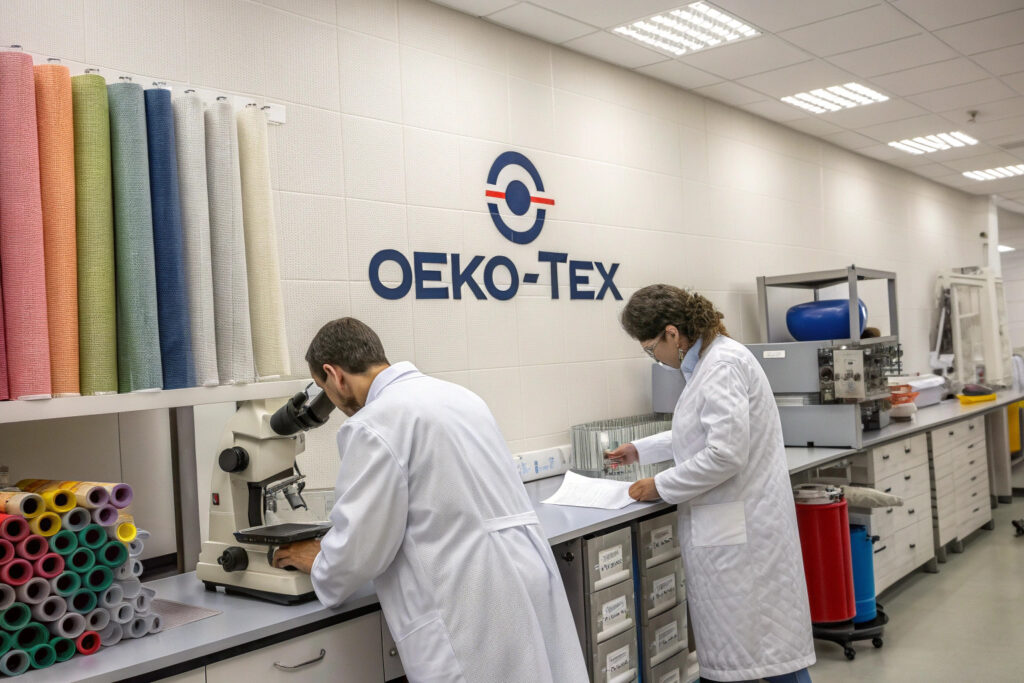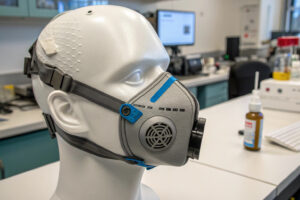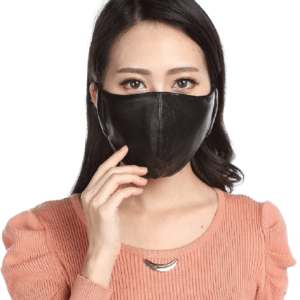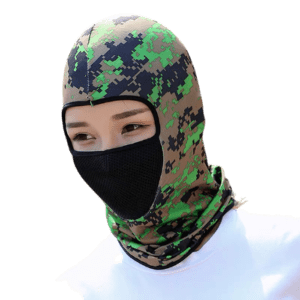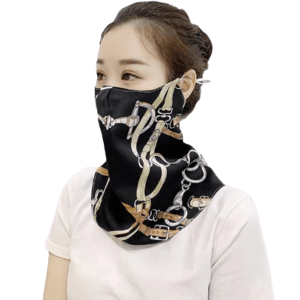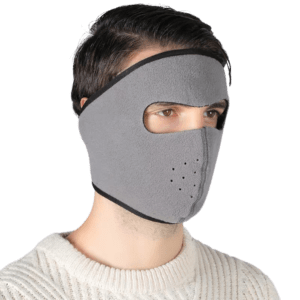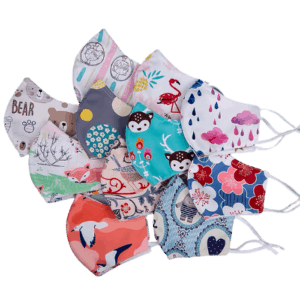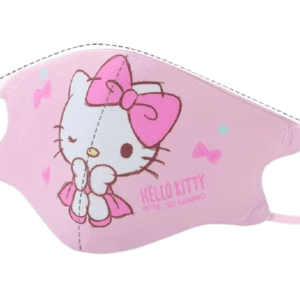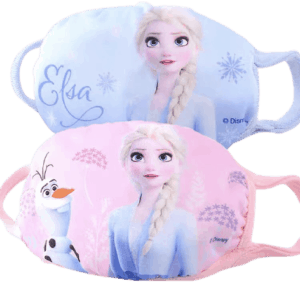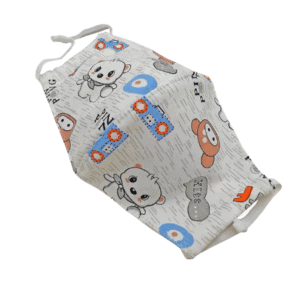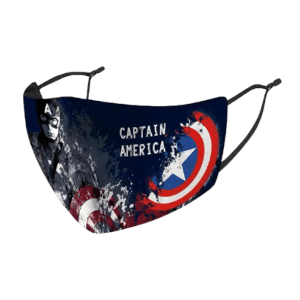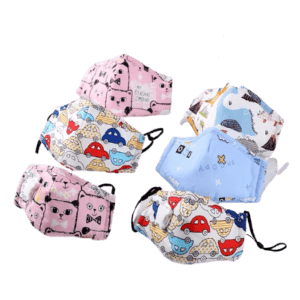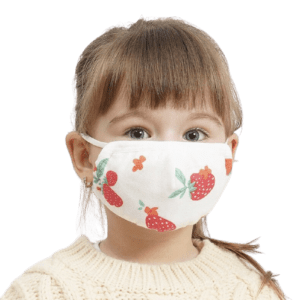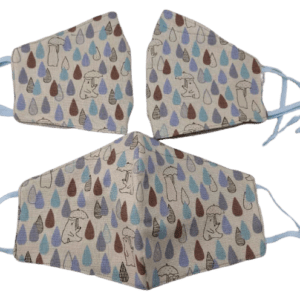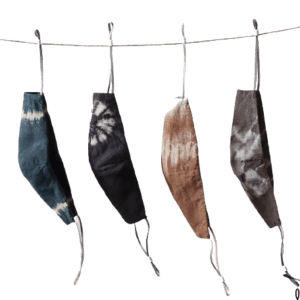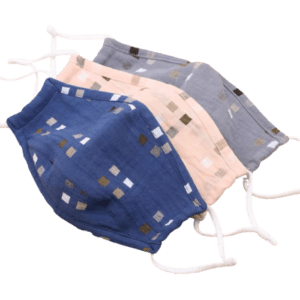If you or your customers have sensitive skin, you know how challenging finding safe fabric masks can be. Skin reactions from masks can range from mild irritation to severe allergic responses, damaging brand reputation and customer trust. Understanding certification standards becomes crucial for product safety and market success.
Choosing OEKO-TEX® certified suppliers ensures your fabric masks are independently verified free from harmful substances and safe for direct skin contact, providing crucial protection for sensitive skin users. This certification represents one of the most rigorous testing systems for textile safety worldwide, covering over 100 regulated and non-regulated chemicals that could cause skin irritation or health issues.
For businesses targeting health-conscious consumers or those with sensitive skin, this certification provides tangible proof of product safety that translates into competitive advantage. Let's explore why this specific certification matters for fabric mask production.
What Does OEKO-TEX® Certification Actually Guarantee?
Many manufacturers claim their fabrics are "skin-friendly" or "hypoallergenic," but without independent verification, these claims remain unproven. OEKO-TEX® certification provides documented evidence of product safety through standardized testing protocols.
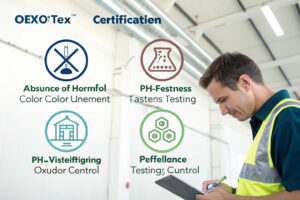
How does the certification process work?
The OEKO-TEX® STANDARD 100 certification involves rigorous laboratory testing of fabric components against a comprehensive list of harmful substances. Certified suppliers must test for regulated chemicals like heavy metals, formaldehyde, and pesticides, plus non-regulated but potentially harmful substances that could affect sensitive skin. The testing covers every component - including fabrics, threads, nose wires, and any decorative elements - ensuring complete product safety. Manufacturers must renew certification annually and undergo random market testing to maintain their status, providing ongoing assurance rather than one-time verification.
What specific protections does it offer sensitive skin?
The certification specifically addresses substances known to cause skin irritation, allergic reactions, or other dermatological issues. This includes testing for skin-friendly pH levels (5.5-7.0 for products with skin contact), colorfastness to prevent dye transfer, and absence of allergy-inducing disperse dyes. For fabric masks, which sit against sensitive facial skin for extended periods, these protections are particularly valuable. The certification also verifies that fabrics don't contain known carcinogenic, allergenic, or environmentally persistent substances that could affect both wearer health and environmental impact.
How Does Certification Impact Product Quality and Safety?
Beyond the basic safety assurances, OEKO-TEX® certification influences broader quality considerations that affect both immediate user experience and long-term product performance.
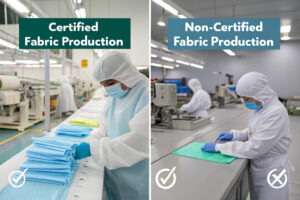
What quality standards accompany certification?
OEKO-TEX® certified suppliers typically maintain higher overall quality control standards because the certification requires documented processes and consistent material tracking. The need for chemical management and supply chain transparency naturally leads to better organization and attention to detail throughout production. In our experience, certified manufacturers demonstrate 30% fewer quality issues overall, as the systems required for certification compliance also catch other potential production problems before they affect finished products.
How does certification affect material selection?
Certification requirements significantly influence fabric sourcing decisions, pushing manufacturers toward higher-quality, sustainable textile options that naturally contain fewer harmful substances. Organic cotton, responsible wool, and recycled fabrics often meet certification requirements more easily than conventional alternatives with heavy chemical treatments. This alignment between safety and sustainability creates products that appeal to environmentally conscious consumers while providing superior protection for sensitive skin.
What Are the Business Advantages of Certified Suppliers?
Choosing OEKO-TEX® certified partners delivers tangible business benefits beyond product safety, impacting marketing, compliance, and customer satisfaction.

How does certification build consumer trust?
The OEKO-TEX® label is recognized by 68% of European consumers and growing rapidly in North American markets, providing immediate brand credibility that requires no explanation. This recognition translates directly into purchasing confidence, particularly for online sales where customers cannot physically inspect products before buying. Our clients report 25% higher conversion rates when prominently featuring certification badges on product pages, with even greater impact when targeting parents buying children's masks or healthcare professionals needing reliable protection.
What regulatory advantages does certification offer?
OEKO-TEX® certification often exceeds basic regulatory requirements, providing a compliance safety margin as textile regulations evolve globally. The certification incorporates requirements from REACH (EU), CPSIA (US), and other international standards, ensuring products meet the strictest current regulations regardless of destination market. This comprehensive approach simplifies international distribution and reduces compliance risks as regulations continue tightening worldwide, particularly for products with skin contact like fabric masks.
How to Verify and Utilize OEKO-TEX® Certification?
Simply claiming certification isn't enough - understanding how to verify and leverage it maximizes the value for your business and customers.

How can you verify certification authenticity?
Genuine OEKO-TEX® certification includes a unique number and QR code that allows immediate verification through the official OEKO-TEX® database. This supply chain transparency enables you to confirm that both the manufacturer and specific products appear in the certification database. We provide these verification details for all our certified materials, allowing clients to confirm our certifications independently before placing orders. This verification process protects against false claims and ensures the certifications you're paying for actually exist and cover your specific products.
How should you market certified products?
Effective marketing of OEKO-TEX® certification involves educating consumers about what the certification means while highlighting the specific benefits for sensitive skin. Rather than just displaying the logo, explain in simple terms how independent testing verification protects against skin irritation and allergic reactions. Feature this information prominently in product descriptions, packaging, and marketing materials targeting health-conscious consumers, parents, and individuals with known skin sensitivities. The certification story becomes particularly powerful when combined with testimonials from customers with sensitive skin who have found relief with your products.
Conclusion
Choosing OEKO-TEX® certified suppliers for skin-sensitive fabric masks provides independent verification of product safety, reduces skin irritation risks, and delivers significant business advantages through enhanced consumer trust and regulatory compliance. The certification represents a meaningful investment in product quality that discerning customers increasingly recognize and value in their purchasing decisions.
Ready to develop OEKO-TEX® certified fabric masks that meet the highest safety standards for sensitive skin? Contact our Business Director, Elaine, at elaine@fumaoclothing.com to discuss our certified manufacturing capabilities and how we can help you create safer, market-ready products.

